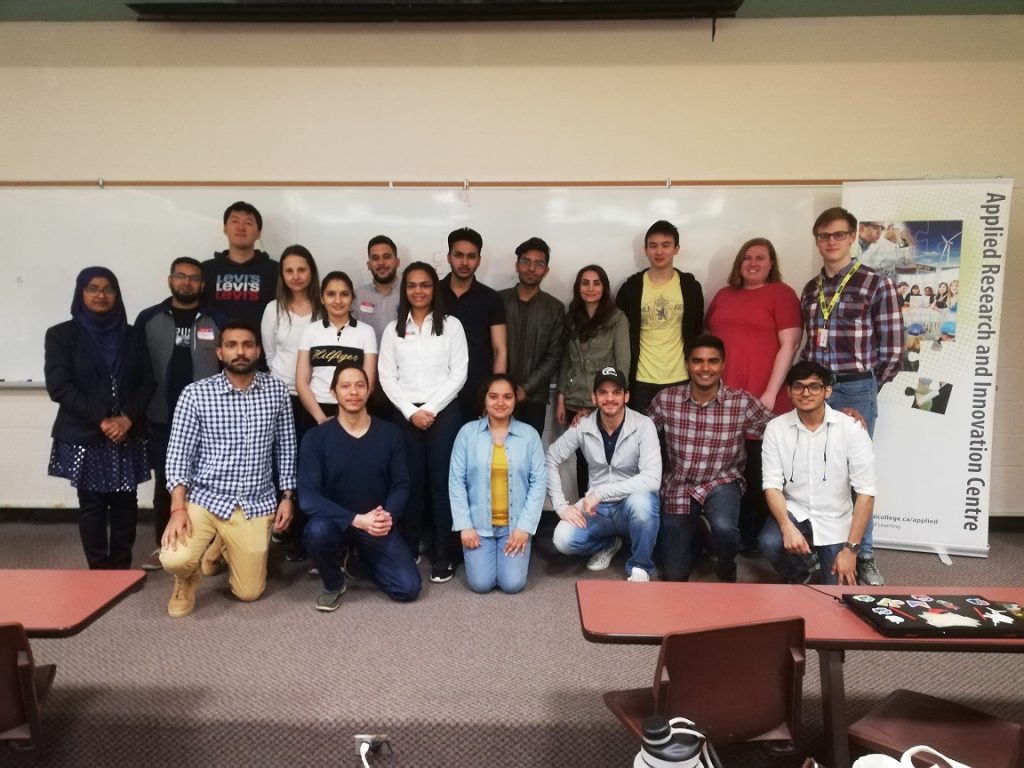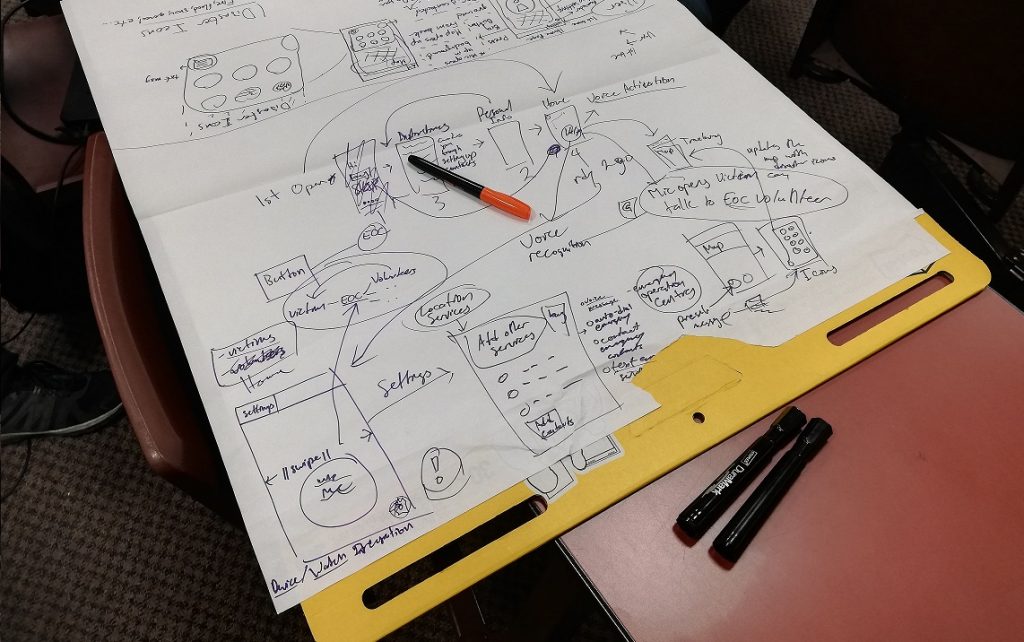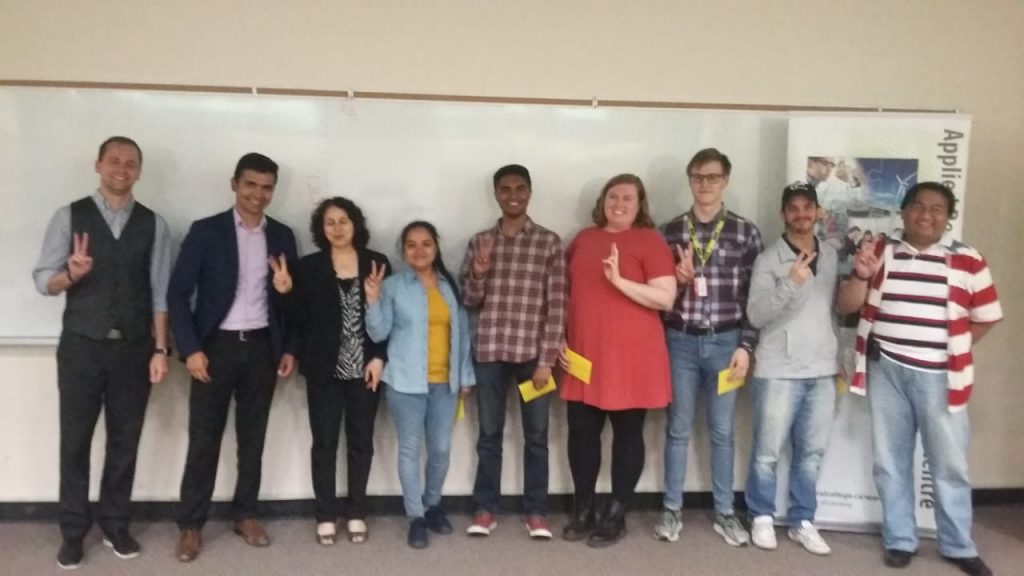Centennial students design mobile app for vulnerable people in emergencies

Student participants of hackathon with Interdev, May 30-31, 2019
For 24 Centennial College students, their classroom experience took them to a WIMTACH hackathon.
For two days – May 30th and 31st – four groups of six students each from Software Engineering programs gathered in the College’s auditorium to take on an innovative, hackathon challenge presented by WIMTACH and one of its industry clients, Interdev, in just 48 hours.
Chirag Rana of Interdev first approached WIMTACH’s Director, Dr. Purnima Tyagi, about a problem he wanted to tackle months ago, and a hackathon was put on the table:
“We told [Dr. Tyagi] we have this problem and we’re looking for some innovative solutions for this problem. In the brainstorming session, Majura [Research Associate with WIMTACH] said, “how about we have a hackathon and let students find a solution for us and use the creativity of multiple people instead of just one?””
Hackathons are collaborations between WIMTACH and its industry partners on the Centennial College Progress campus. Alongside clients and WIMTACH, students come together in groups to solve a challenge presented to them by the client – Interdev in this case – in a specified length of time. Interdev is a Toronto-based company that develops data solutions in the Emergency Services sector.
The Challenge Is A Real One

Interdev’s software, Emergency Operations Centre (EOC), is designed to connect trained volunteers with Vulnerable Isolated People (VIPs) in the case of initial non-medical emergencies. However, the problem Interdev had was an absence of a prototype that their volunteers could use on their mobile app.
The hackathon challenge was to design a prototype that:
- works on a mobile device
- informs and interacts with volunteers and Vulnerable Isolated Persons (VIPS)
- is compatible with Interdev’s software, the Emergency Operations Centre (EOC)
Each group was given a list of scenarios and issues to consider while designing their mobile application. VIPs, for example, are often elderly with mobility issues, and volunteers could have connectivity issues while trying to access the mobile application. To make the winning prototype, each group had to think beyond these issues and scenarios to develop a robust solution that stands out from the competition.
The Student Benefit Is Invaluable

Hackathons are a way for to WIMTACH provide students with opportunities to receive Canadian job experience on campus while they’re still here. The experience that they gain is invaluable. Oleksandr Palchevskyi, a hackathon student participant, explains:
“Taking part in any competition [before graduating] is a good point for your resume because it shows that you are interested in your industry…it helps students to feel the real work environment and see market competition that will prepare them for real work challenges.”
[picture]
With 8 minutes to go, Chirag expressed his hopes for the presentations.
“I hope I get surprised by some of the solutions that I never thought about or combine those solutions together. And even see if they bring up new issues we never thought of.”
The Results Are In
WIMTACH enlisted a panel of esteemed judges, including the new Executive Director of ARIC, Jonathan Hack, to judge each groups’ presentations based on a pre-approved list of criteria. The judges asked each group critical questions to better understand how their prototypes addressed the issues they were given at the beginning of the hackathon.
After careful deliberation, the judges came to a conclusion:

The Yellow team – Joel Saji, Zoe Paré, Oleksandr Palchevskyi, Nina Javadvand Tamar, Simerjit Kaur and George (Qian Long) Zhou – won first place in the hackathon.
The Future Is Bright
But beyond winning, Simerjit Kaur revealed that the best part about participating in a hackathon was working in a team. “I learned how to work in a team and have each other’s opinions. Having numerous opinions and managing them in such a way that a group comes with the best possible solution. I learned numerous things, that will help me in the future.”
For Interdev, the future is bright and promising. “[Organizing the hackathon with WIMTACH] was [on] such short notice, but it’s been excellent. Hopefully, whatever we come up with [here] we can move onto further projects and implement that solution,” said Rana.
The next hackathon will happen early July. To receive details, please subscribe to WIMTACH’s newsletter.


0